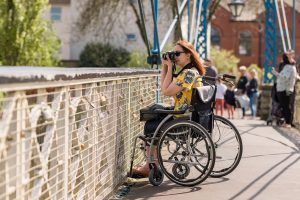The great outdoors has always been a source of adventure and exploration, a realm where individuals seek connection with nature and challenge their limits. However, for people with disabilities, accessing and enjoying outdoor activities can be fraught with barriers. This is where emerging technologies like Neuralink’s brain-computer interface (BCI) come into play, potentially revolutionizing accessibility in outdoor environments.
Breaking Barriers with Neuralink
Neuralink, spearheaded by Elon Musk, has been making strides in developing a BCI that enables direct communication between the brain and external devices. While its primary focus has been on medical applications, especially for individuals with paralysis or motor function impairments, the potential for this technology to enhance outdoor accessibility is immense.
Empowering Mobility and Independence For Adventurers With Disabilities
For many individuals with physical disabilities, activities like hiking, camping, or simply navigating rough terrain can be challenging. Neuralink’s technology could empower them with greater mobility and independence. By controlling prosthetic limbs or mobility aids through thought alone, they could engage more freely in various outdoor activities, reducing reliance on assistance and enhancing their experience of nature.
Imagine a person with paraplegia being able to hike through a forest trail, control their wheelchair effortlessly, or even participate in rock climbing without physical limitations. This level of freedom and empowerment could significantly change the lives of those with disabilities, making outdoor adventures more accessible and enjoyable.
Enhanced Sensory Experiences
Outdoor exploration is as much about sensory experiences as it is about physical activity. Neuralink’s BCI could potentially augment these experiences for individuals with sensory impairments. For instance, auditory or visual cues from the environment could be translated into alternative sensory feedback, enabling a person with visual impairments to ‘experience’ the beauty of a sunset or the serenity of a forest through different sensory modalities.
Imagine a world where someone who is deaf can feel the vibrations of a rushing river or a thunderstorm through their neural interface. Or where someone who is blind can experience the colors of a sunrise as patterns of tactile sensations on their skin. Neuralink’s technology holds the promise of expanding the sensory horizons of those with disabilities, allowing them to engage more deeply with the natural world.
Safety and Communication
Safety is a paramount concern in outdoor activities, especially for individuals with disabilities. Neuralink’s technology could offer advanced solutions for communication and monitoring in remote areas. For instance, individuals could send distress signals or communicate their needs and location through thought-activated devices, enhancing their safety during outdoor adventures.
This technology could potentially save lives in situations where immediate assistance is required. Consider a scenario where a person with a disability is exploring a remote wilderness area and encounters an unexpected emergency. With Neuralink’s communication capabilities, they could swiftly signal for help, providing rescuers with their precise location and condition, ultimately improving their chances of a safe rescue.
Challenges and Considerations
While the potential benefits of Neuralink’s technology for outdoor accessibility are exciting, there are several important challenges and considerations that must be addressed:
- Reliability and Safety: Neuralink’s BCI must be highly reliable and safe for use in various environmental conditions. The technology needs to withstand exposure to the elements, shock, and vibrations without compromising functionality or posing risks to users.
- Privacy and Data Security: As with any technology that interfaces with the human brain, there are significant privacy and data security concerns. It is crucial to establish robust safeguards to protect users’ neural data from unauthorized access or misuse.
- Equitable Access: Ensuring that individuals with disabilities from diverse backgrounds have access to Neuralink’s technology is essential. It should not become an exclusive privilege available only to those with significant financial means.
- Ethical Considerations: The ethical implications of brain-computer interfaces extend beyond accessibility. Questions about consent, autonomy, and the potential for altering human cognition and behavior must be carefully examined.
- Regulatory Approval: The development and deployment of such advanced technology will require rigorous regulatory oversight to ensure safety, effectiveness, and ethical compliance.
Conclusion
The prospect of using Neuralink’s brain-computer interface technology to revolutionize accessibility in outdoor environments is a testament to the power of innovation in enhancing human experiences. As this technology continues to develop, it holds the promise of opening new doors to adventure and exploration for individuals with disabilities, allowing them to experience the joys of the great outdoors in ways that were previously unattainable.
Neuralink’s work in this area represents a significant step toward a more inclusive and accessible world for all. By breaking down barriers and harnessing the potential of the human brain, we can create a future where everyone, regardless of physical abilities, can fully participate in the exhilarating beauty of the natural world. It is a journey that combines cutting-edge technology, compassion, and a deep appreciation for the limitless possibilities of human potential.
Visit Neuralink’s official website for the most up-to-date information on their research, technology developments, and official announcements regarding their brain-computer interface technology.









